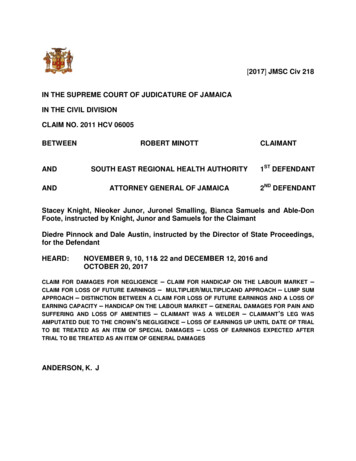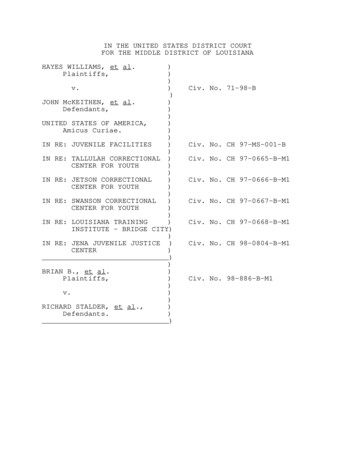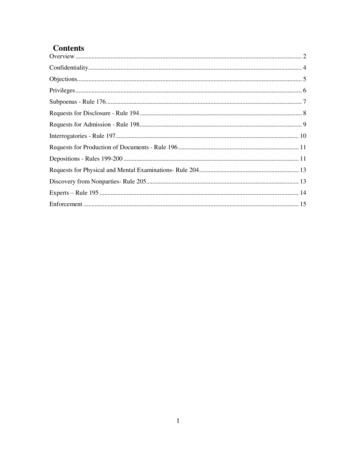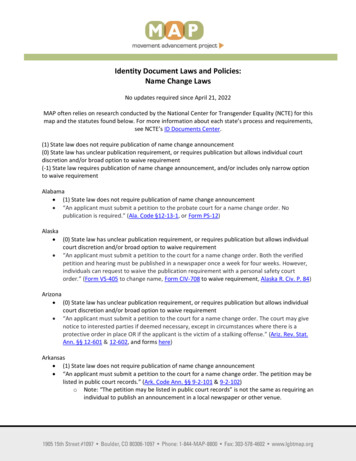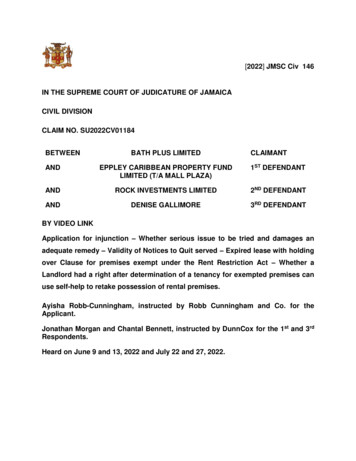
Transcription
[2022] JMSC Civ 146IN THE SUPREME COURT OF JUDICATURE OF JAMAICACIVIL DIVISIONCLAIM NO. SU2022CV01184BETWEENBATH PLUS LIMITEDCLAIMANTANDEPPLEY CARIBBEAN PROPERTY FUNDLIMITED (T/A MALL PLAZA)1ST DEFENDANTANDROCK INVESTMENTS LIMITED2ND DEFENDANTANDDENISE GALLIMORE3RD DEFENDANTBY VIDEO LINKApplication for injunction – Whether serious issue to be tried and damages anadequate remedy – Validity of Notices to Quit served – Expired lease with holdingover Clause for premises exempt under the Rent Restriction Act – Whether aLandlord had a right after determination of a tenancy for exempted premises canuse self-help to retake possession of rental premises.Ayisha Robb-Cunningham, instructed by Robb Cunningham and Co. for theApplicant.Jonathan Morgan and Chantal Bennett, instructed by DunnCox for the 1st and 3rdRespondents.Heard on June 9 and 13, 2022 and July 22 and 27, 2022.
-2PALMER, JBackground[1]The Applicant, by its Notice of Application for Court Orders, sought orders asfollows:1) An injunction restraining the Defendants, its servant and/or agents from:(a) Re-enter and retaking possession of that part of premises known as Shop #6DMall Plaza situated at 20 Constant Spring Road, Kingston 10 in the parish ofSt. Andrew which the Applicant holds as lessee from the 1st and 2nd Defendantsand which houses the Applicant’s business place Bath Plus.(b) Obstructing and/or interfering with the Applicant’s use and enjoyment of thatpart of the premises which the Applicant’s business.(c) Obstructing and/or interfering with the business and lawful activities of theClaimant/Applicant on the part of the premises which houses the Applicant’sbusiness in any manner whatsoever, whether by themselves, their servants,agents or otherwise.(d) Trespassing onto that part of the premises known as Shop #6 Mall Plaza, 20Constant Spring, Kingston 10 in the parish of St. Andrew which the Claimantholds as tenant in any manner whatsoever, whether by themselves theirservants, agents or otherwise.2) The Claimant undertakes to pay reasonable damages resulting from thegranting and extension of the injunction.3) This Order along with the ex parte Notice of Application for Court Orders andaffidavits in support are to be served on the Defendants within 24 hours fromthe date of this Order.4) Costs.[2]The Claimant company, Bath Plus Limited (“BPL”), entered into a lease agreementwith the 2nd Defendant, Rock Investments Limited, for a duration of three years forthe premises located at Shop #6D Mall Plaza (“the Shop”) located at ConstantSpring in St. Andrew. The Shop is the subject of a Certificate of Exemption from
-3the Rent Restriction Act (“the Act”) since 1985, which exempts the Shop from theprovisions of the Rent Restriction Act and the lease was due to expire in July 2021.By letter dated November 20, 2020, the 1st Defendant, Eppley Caribbean PropertyFund Limited (T/A Mall Plaza) (“Eppley”) advised BPL that it had acquired theinterest in the Mall Plaza in which the Shop is located and that the monthlypayments under the lease would remain in line with the existing lease agreement.[3]Eppley advised BPL by letter dated November 20, 2020, that it had acquired aninterest in Mall Plaza in which the Shop is situated, and advised that paymentswould remain in line with the existing lease agreement. BPL says that they kept tothe terms of the agreement and in January 2021 wrote to Eppley requesting arenewal of the lease for an additional five years. In turn, presumably pendingconsideration of the request, Eppley agreed to abide by the terms and conditionsof the lease. On March 9, 2021, BPL received word from Eppley that their requestwas still being considered and apologised for the delay. There however does notseem to have been any other written communication and the lease expired on June30, 2021, and there was no renewal, but the Claimant continued to hold overpursuant to the provisions of the lease and continued to monthly rent.[4]On February 22, 2022, BPL was served with a Notice to Quit that was erroneouslydated March 22, 2022, and gave the Claimant a period of one month to vacate theShop and deliver up possession, due to expire on March 31, 20222 (“1st Notice”).Another Notice to Quit dated February 23, 2022(“2nd Notice”), was found on theShop floor by the Claimant on or about February 24, 2022, according to its affidavitevidence, in substantially the same terms as the 1st Notice. The Respondents saythat the 2nd Notice was served on the Claimant’s employee, Charmaine Grant, onFebruary 23, 2022. The 2nd Notice is in substantially the same terms and alsoexpired on March 31, 2022.[5]By letters dated March 28, 2022, March 30, 2022, and March 31, 2022, BPL saysit was threatened by the 1st Defendant that it would recover possession of the Shopby midnight March 31, 2022. Another letter was sent after the expiration of the
-4Notice on Eppley’s behalf indicating that it would retake possession within twentyfour hours. Eppley attempted to retake possession by affixing locks to the Shopdoor, which Applicant alleged was a trespass and BPL had the locks removed bythe afternoon of April 1, 2022. Eppley’s agents padlocked and chained the Shopagain and BPL once again removed it and after several attempts at retakingpossession, the Applicant engaged a locksmith to restore access to the Shop.[6]The Applicant stated that it does not owe rent and paid the April 2022 rent. Theinjunction was sought as undue hardship was likely to be caused to its business inhaving to relocate, as it had 23,000,000 in inventory and spent 5,000,000 torenovate the Shop in 2017. Also, business was improving since the lifting ofCOVID-related curfews. BPL also stated that it should be given due considerationas it had endured dust nuisance and loss of business when the Mall Plaza wasbeing renovated, and it continued to pay rent. It contends that damages would notbe an adequate remedy in the circumstances and gave its undertaking as todamages.[7]Counsel for Eppley referred to Clause 4 (28) (b) of the lease agreement relating toholding over after the lease expired. A new tenancy was created with the consentof the Landlord and without the need for any express agreement in writing,terminable by either party by one month’s written notice to the other expiring at theend of the month of the tenancy. Eppley agrees that the 1st Notice served on BPLon February 22, 2022, was inadvertently dated March 22, 2022, and was postedon the Shop door after service on BPL staff failed. The 1st Notice nonethelessrefers to “Charmaine” as the person on whom service was effected. BPL claimedthe 2nd Notice was found on the ground on February 24, 2022, But Eppley says itwas served on BPL’s employee, Charmaine Grant, on February 23, 2022, set toexpire March 31, 2022.[8]Eppley claims that in addition to informing the Claimant, through its principalsRetinela and Gladstone Mallit, of the fact of the 1st Notice, it sent several reminderletters and emails as it got closer to the March 31, 2022 deadline in the Notice to
-5Quit. The Applicant does not deny receipt of the second Notice to Quit or thereminder letters. When BPL Claimant failed to vacate the Shop by March 31, 2022,Eppley says that it exercised its lawful right to peaceably re-enter into possessionof the Shop by having its agent place a padlock on the entrance door on April 1,2022. These were removed by BPL and it re-entered possession of the Shopwithout the consent of the 1st Defendant.[9]Eppley had its agents replace the padlock and chain on the entrance door of theShop on several occasions in its attempt, according to the affidavits filed on itsbehalf, to re-take peaceable possession of the Shop but these were also removedby the Claimant or its agents. No further locks or chains were placed on the doorsafter April 3, 2022, and on April 4, 2022, BPL filed its Claim and Notice ofApplication for Court Orders seeking injunctive relief. The Claim seeks damagesfor trespass, loss of quiet enjoyment of leased premises, loss of profits fromtrespass, aggravated and exemplary damages, special damages and aninjunction. The 1st and 3rd Defendants filed a Defence and Ancillary Claim seekinga declaration that the tenancy had been terminated, damages for trespass againstthe Claimant company, payment of an agreed rental adjustment for the time theClaimant has withheld possession and damages for breach of contract.[10]When the parties appeared on April 7, 2022, the 1st and 3rd Defendants consentedto an interim injunction being granted to prevent Eppley from re-entering andretaking possession of the Shop, subject to their right to rely on the terms of thelease agreement, until the hearing date on April 25, 2022. The injunction wasextended on that date and the hearing of the application for injunctive relief wasfixed for June 9, 2022.SubmissionsBPL[11]Counsel for BPL submitted that there were two issues to be determined:
-6(i) Whether the Defendants can forcefully evict the Claimant and lock down therented shop without a Court Order;(ii) Whether the injunction should remain until the Court grants the eviction order.[12]Counsel cited the authority of Bowes v Anderson [1894] 1 QB 164 for theproposition that the tenancy is terminable by a valid Notice to Quit and is authorityfor the premise that every Notice to Quit must expire at the end of the periodictenancy. It was submitted further, relying on the decision in Lemon v Lardeur[1946] 2 All ER 329, that the notice must accurately reflect the date on which thenotice should expire. It was submitted that both Notices to Quit were invalid anddid not effectively terminate the tenancy. While it was acknowledged that the Shopis indeed exempt from the provisions of the Rent Restriction Act, the exemptionrelated only to the right to increase rent over and above the prescribed rate.[13]On the authority of American Cyanamid v Ethicon [1975] AC 396 Counseloutlined the criteria that must be satisfied in the grant of an injunction. It wassubmitted that there is a serious issue to be tried as a Landlord ought not to bepermitted to recover possession of premises without an order of the Court, save ininstances where no more than the necessary amount of force is used. It was furthersubmitted that where a Claimant has proved that there is a serious issue to betried, the status quo should be preserved until the final determination of the claim(Reliance placed on Karren Goulbourne v Associated Gospel Assemblies[2019] JMSC Civ. 103).Eppley[14]Counsel for Eppley submitted that the injunction granted should be discharged asthere is no serious issue to be tried. Relying on the dicta of Lord Diplock inAmerican Cyanamid it was submitted that the Court in considering whether or notto grant an injunction, should be satisfied that the Claim is not frivolous or vexatiousand that there is a real prospect of success. For the Claimant to succeed, Counsel
-7argued, it would have to prove that the Defendants trespassed on its land orbreached their right to quiet enjoyment under the lease.[15]It was submitted that the provisions of the Act do not apply to the Shop, due to theCertificate of Exemption granted in 1985. Therefore, the reasons as outlined insections 26 and 31 of the Act (relating to reasons for the issuance of a Notice toQuit under the Act) do not apply to Shop. It was submitted that as the tenancy wasduly determined, Eppley did not need to obtain a court order to recover possessionbut could exercise self-help to recover the exempted premises once no more thanreasonable force was utilised (See Wilson v Campbell Claim no. 2007 HCV02615, paragraph 37 and Butcher v Mayor, Aldermen and Burgesses of theBorough of Poole [1942] 2 All ER 572).[16]It was submitted that the Eppley needs only show that it complied with therequirement for Notice under the lease, before seeking to retake possession. Itwas submitted further that BPL’s contention that Eppley could only recoverpossession after the expiration of the lease if the Claimant had defaulted on itsrental obligation, was incorrect. Counsel contended that this was not a case of reentry being due to a breach of an obligation or outstanding rent. The lease havingbeen determined due to effluxion of time, the tenancy could be terminated bywritten notice of a month, entitling the Landlord to re-enter possession. Clause 4(28) (b) of the Lease provides that the monthly tenancy created is terminable byeither party by one month’s written notice and does not stipulate any requirementfor there to be default on the part of BPL. Counsel posited that for the Court torequire an act of default would be akin to treating the lease as if it subsists andwould impose obligations on the parties to which they did not agree.[17]While Counsel acknowledged the inadvertent insertion of the March 22, 2022 dateon the 1st Notice served, any issue was resolved by service of the 2nd Notice onFebruary 23, 2022. The 2nd Notice was issued more out of an abundance of cautionthan out of a belief that it was insufficient to bring an end to the tenancy and wassufficient to determine the tenancy, he submitted. With the expiration of the Notice
-8and there being several reminders by the Defendants, Eppley’s intention wasmade clear. It was Counsel’s position that none of the methods to retakepossession involved unnecessary force, threats or trespass and affixing thechain/padlocks to the Shop door was done when no one was present. The lettersissued after the 2nd Notice were not threats but simply reminders as the end of thenotice period drew nearer. It was there submitted that the Court should find thatthe Claimant has failed to show that there is any serious issue to be tried andrefuse the injunction.[18]On the issue of whether damages would be an adequate remedy, it was submitted,relying on the principles laid down in American Cyanamid and NationalCommercial Bank Ltd. v Olint Corp. Limited, Privy Council Appeal No. 61 of2008 that the Court should determine whether BPL is likely to succeed at the trialin establishing whether there is a serious issue to be tried and if not, the injunctionshould be refused. If the measure recoverable at common law in damages wouldbe adequate, and the Defendants would be in a financial position to pay damages,no interlocutory injunction should be granted. It was submitted that BPL did notpresent any evidence to suggest that it would incur losses that cannot becompensated for in damages, an issue fundamental to whether an injunction oughtto be extended. BPL’s claim speaks primarily about monetary lossescompensatable by an award in damages, and there was no evidence of loss thatis not financial.[19]Counsel for Eppley submitted that the lease made provision where the tenant holdsover after the determination of the lease by effluxion of time, which BPL alsoacknowledges. However, he disagreed with BPL’s position that after the lease hadexpired, the only way to bring the tenancy to an end was by default on the BPL’spart, such as non-payment of rent. It is illogical, it was argued, for Eppley to onlybe able to recover possession of the Shop from BPL if it is in default, and if thatdefault is corrected, such as by paying outstanding rent, for example, BPL couldcontinue to hold over indefinitely.
-9[20]Counsel submitted that the Claimant’s position that the exemption under the Actonly applies to the increases in rent but not to the right to retake possession withouta Court Order, is not mistaken. The circumstances in the Goulbourne case,Counsel posited, were distinguishable from those that pertain in the case at bar.In Goulbourne, the issue concerned whether the exemption could extendretroactively; an issue not relevant to this case.Analysis[21]The authorities of American Cyanamid v Ethicon as applied by the Privy Councilin NCB v. Olint have outlined the applicable law to be considered in determiningwhether an injunction should be granted and have been refined to the followingthree criteria:(i) Is there a serious issue to be tried?(ii) Are damages a sufficient remedy?(iii) Does the balance of convenience weigh in favour of a grant of an injunction?[22]The Claimant contends that there is a serious issue to be tried as the tenancy hasnot been validly determined by either the 1st or 2nd Notices. While it acknowledgesthat the Shop is exempt from the provisions of the Act, it says that this would onlyapply to the increase of rent and even if the Landlord was entitled to recoverpossession it ought to be by way of an application to the Court save where no morethan necessary force was used. Eppley agrees that the exemption applies but doesnot agree that it is limited to the issue of rental increase but entitles Eppley torecover possession by means of self-help once a valid notice to quit, which neednot include any of the reasons outlined in the Act, has been served. Eppley alsoargues that the Goulbourne case supports it position as in that case, theexemption was only ruled inapplicable to the relevant lease as the Claimant soughtto apply it to a lease that had been entered into before the exemption was obtained.
- 10 That is not an issue relevant to the case at bar as the exemption was in place longbefore the current lease had been entered into by the parties.[23]In the Wilson case, the Court held that a tenant-at-will could not benefit from theprovisions of the Act like rent-paying tenants would. The parallel being drawn tothis case is that BPL is not a tenant under the Act due to the fact of the exemption.Accordingly, as in Wilson, Eppley’s position is that it is entitled to exercise its rightto self-help provided that no more force than reasonable was extended.[24]There is no dispute that the relevant lease was determined by effluxion of time,and BPL acknowledged this fact, for as the time counted down towards the lease’sexpiration, BPL wrote to Eppley regarding a five-year renewal. The lease expiredand BPL held over, and Clause 4 (28) (b) of the lease outlined what would happenin the event of the Claimant holding over:(b) in the event of the Tenant holding over at the expiration of the Term herebycreated with the consent of the Landlord and without making any expressagreement in writing for a new tenancy, the tenancy during the period of suchholding over shall be deemed to be a monthly tenancy on such terms andconditions herein as shall be applicable to a monthly tenancy terminable by eitherparty by one month’s written notice to the other, expiring at the end of the monthof the tenancy.[25]Apart from a letter in March 2021 in which Eppley wrote to BPL advising that therequest for a new lease was being considered, the next communication seems tohave been the 1st Notice on February 22, 2022. While there may have been anissue with the date stated on the 1st Notice, BPL does not deny that it received iton the date that Epply alleges. The 1st Notice included the particulars of the Shop,the date the Notice expired and the date on which it was served. The 1 st Noticebears a date of March 22, 2022 which the Claimant knew was erroneous, not justbecause it was acknowledged by the Mallits as received on February 22, 2022, butthe 1st Notice also bears the date of service on BPL’s employee, Charmaine, asbeing February 22, 2022. The notice period was stated to expire on March 31,2022, which is the end of the monthly tenancy. The reasons stated in the noticewere:
- 11 (i) The premises, being a commercial building is reasonably required by thelandlord for use by them for business and trade;(ii) The premises is required for the purpose of being repaired, improved orrebuilt; and(iii) Expiry of the Lease agreement for Shop #6 on June 30, 2021.[26]I do not find that the error in the date of the 1 st Notice invalidated the notice andmet the requirements under Clause 4 (28) (b) that permitted for a notice period ofa month. The issuance, however, of the 2nd Notice the following day, had the effectof superseding the 1st Notice on February 22, 2022. The affidavit of service filedon behalf of Eppley states that the 2nd Notice was served at the Shop on the BPL’semployee, Charmaine Grant. While BPL initially acknowledged the receipt of the2nd Notice to Quit as being on March 22, 2022, it subsequently acknowledged thatit was received on February 24, 2022.[27]Service of the 2nd Notice on March 22, 2022, could have invalidated that 2nd Noticeas being effective to determine the monthly tenancy, and having superseded the1st Notice, could have been viewed as being an insufficient notice period.Unfortunately, though later corrected, the interim injunction would have placedreliance on this erroneous date of service of the 2nd Notice, an issue that formed asubstantial part of the original submissions on BPL’s behalf. BPL amended itsposition to say that it received the 2nd Notice on February 24, 2022, and eventhough it does not acknowledge receipt of the 2nd Notice on February 23, 2022, asEppley contended, this is a sufficient notice period to meet the requirement ofClause 4 (28) (b). The 2nd Notice was served at BPL’s business place, the Shop,and splitting hairs as to whether this was on February 23 or February 24, 2022, isunnecessary, as both dates exceed the one-month notice period required.[28]I find that the 2nd Notice was in fact served on BPL at the Shop, the location of itsbusiness, on February 23, 2022. The main basis for the Claimant saying that itsclaim has a reasonable likelihood of success at trial, and a Court would likely findthat the injunction was rightly granted, is essentially whether the tenancy wasvalidly determined by any of the Notices it received. I find that while the 1st Notice
- 12 would have been adequate to determine the monthly tenancy, the 2nd Noticesuperseded it, and is accepted as giving the appropriate notice period sufficient todetermine the monthly tenancy.[29]Counsel for both BPL and Eppley acknowledged that where the Act does not apply,a party may employ self-help methods to retake possession once it uses only suchforce as is reasonable in the circumstances. The method of force complained ofby BPL included the padlocking/chaining of the Shop doors and letters from Eppleyreminding of the pending expiration of the notice period. I do not find the force usedor the issuance of reminder letters, are, by any stretch of the imagination,unreasonable force in the circumstances. With the exemption to the Act being inplace, the expiration of the notice period at March 31, 2022, and the further letteron April 1, 2022, that the efforts employed by Eppley were entirely reasonable inthe circumstances. It is clear that they abandoned these reasonable efforts afterthe repeated re-entry by the Claimant and clearly, any escalation ran the risk ofbeing viewed as unreasonable. I find that Eppley was entitled to exercise its rightto use self-help to retake possession of the Shop and they were not trespassing.[30]If damages are an adequate remedy, the injunction ought not to be extended.Paragraphs 1 – 5 of the BPL’s Claim Form seeks damages for trespass, loss ofquiet enjoyment and loss of profit from trespass. I have already expressed my viewas to the likelihood of success on the issue of trespass, reasoning that I believeapplies to the cause of action for loss of quiet enjoyment. I do not find that there isa serious issue to be tried as I find the reasonable likelihood that BPL will showEppley is a trespasser is low. The remaining remedy sought relates to an injunctionagainst Eppley to prevent it from harassment or eviction from the leased premises,apparently indefinitely, despite the acknowledged determination of the lease andthe term that allowed for the termination of the tenancy by appropriate notice.[31]There would have been no need to request a new lease had the prior lease stillsubsisted and it is clear that all concerned treated this as a monthly tenancy asprovided for under Clause 4 (28) (b), which explicitly stated that the parties agreed,
- 13 in advance of the expiration of the lease, that BPL would hold over, with theconsent of the Landlord and without need for further written agreement, for amonthly tenancy. I do not find that there is a serious issue to be tried but in anyevent, BPL has its remedy at common law in damages, which I find are adequateto compensate it for any loss proven. Judgment is therefore given on theApplication for the 1st and 3rd Defendants/Respondents as follows:(i) The interim injunction granted is discharged;(ii) Stay of Execution is ordered for seven days pending the circulationof the written decision;(iii) Costs of the Application awarded to the 1 st and 3rd Defendants/Respondents, to be taxed if not agreed;(iv) Applicant’s Attorneys-at-Law to prepare, file and serve the ordersherein;(v) Leave to Appeal is granted to the Applicant.
No further locks or chains were placed on the doors after April 3, 2022, and on April 4, 2022, BPL filed its Claim and Notice of . payment of an agreed rental adjustment for the time the Claimant has withheld possession and damages for breach of contract. . Counsel cited the authority of Bowes v Anderson [1894] .
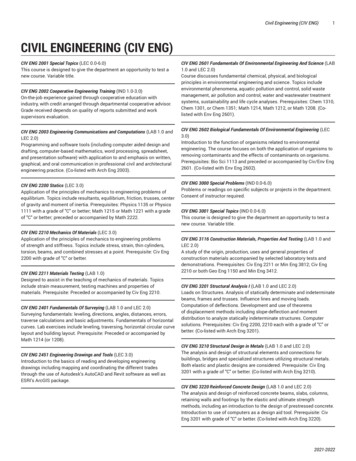
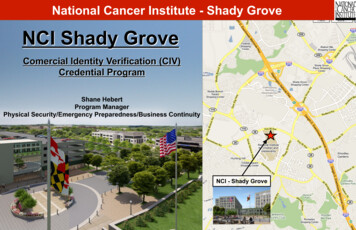

![[2020] JMSC Civ 37 IN THE SUPREME COURT OF JUDICATURE OF JAMAICA IN THE .](/img/22/neil-2c-20george-20v-20the-20attorney-20general-20of-20jamaica-2c-20office-20of-20the-20utilities-20.jpg)
